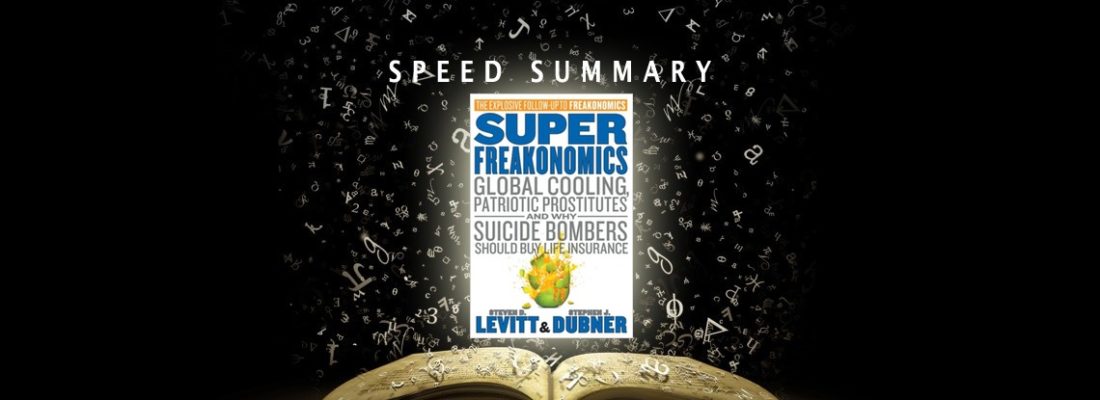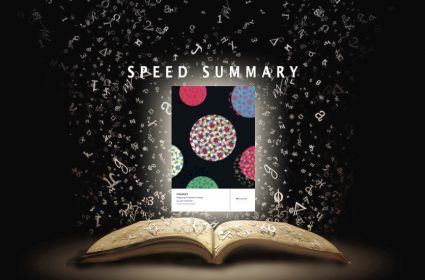Superfreakonomics [Speed Summary]

- Superfreakonomics: Global Cooling, Patriotic Prostitutes and Why Suicide Bombers Should Buy Life Insurance
- Author: Steven Levitt and Stephen J. Dubner
- Publisher: William Morrow
- Publication date: 2009
In a followup to their bestselling Freakonomics (speed summary) economist Steven Levitt and journalist Stephen J. Dubner explore how incentives and the laws of supply and demand are key to understanding and changing behaviour.
Homo-Economicus
Rumours of the death of homo-economicus (economic man) may have been somewhat exaggerated. Sure, as consumers we’re not slaves to the laws of supply and demand (just because there’s more supply, doesn’t mean we’ll only pay less). Nor are we fixated with ‘value maximisation’ (getting the best emotional (or material) bang for our buck). We’re lazy, habitual creatures – and sometimes good enough will do.
But economics does matter, because we are incentive-driven creatures, motivated by the incentives that markets offer us to behave in a particular way. Understanding the incentive structures that motivate behaviour – whether those incentives are economic (material/financial gain), social (reputational gain) or moral (conscience ‘gain’ (feeling good about ourselves)) is key to understanding – and predicting – consumer behaviour
Sex Supply and Demand
- The increase in supply of «free» sex, due to increased pre-marital sex has had a downward pressure on prices paid for sex in the sex trade over the last century
- Pressure on oral sex prices has been particularly extreme, as a waning taboo for oral sex has further increased supply among regular sexual partners, thus reducing street prices – down to just $40 in Chicago
- On public holidays, like the Fourth of July, demand for sex increases, and sex workers increase their prices by 30% (this ‘demand shock’ also brings more supply into the market as people not usually working in the industry temporarily supplement their income by offering sex)
- Because the sex industry is a black market, supply is constrained, keeping prices attractively high (roughly 4x basic wages). To ensure light touch policing, 3% of sex acts are promotional ‘freebies’ given to police – sex workers are more likely to have sex with police officers than be arrested by them
Incentives not Altruism
Why do people help each other? Because they are incentivised to do so – whether it’s a moral incentive (to not feel guilty), a social incentive (to boost reputation), or even an economic incentive – as is the case of kidney donations in Iran. In the US, there are 80,000 people in need of a kidney, but only 16,000 transplants take place each year. In Iran, donors are paid, and there is no waiting list. Rather than ascribe helping behaviour to selfless altruism, we need to look for the incentives driving that behaviour. And when there are no incentives to help, we don’t – as was the case of the Kitty Genovese murder witnessed by 38 people watching – but who did precisely nothing to help. No incentive, no action. Finally, such is the power of incentives, and the expectation we will act according to incentives, we can use incentivised behaviour to mask our true behaviour. For example, suicide terrorists have no incentive to take out life insurance (not covered!), but they should do so since not taking out life insurance is now used in algorithms to identify potential terrorists from financial data.
Simple Solutions
To change behaviour, you not only need incentives – but simple solutions. Complex solutions rarely work – because of the disincentive to learn, acquire and master them. Simple solutions are also often the cheapest. For example, the seatbelt was a simple solution that reduced the risk of car fatalities by 70% – with minimal disincentives to use it. Likewise washing hands before surgery was a simple low-cost solution – with little disincentive to adoption – that has significantly reduced post-surgery complications. On the other hand, reducing green house gasses to manage global warming could be costly and complicated, and it’s currently without compelling incentives to drive behaviour. Could it be better to look for a simpler, low-cost (but controversial) solution – such as a ‘geo-engineering’ approach that involves injecting sulfur dioxide directly into the stratosphere? Simple (relatively) low-cost solutions are usually the best.
The Brand Genetics Take
Like Freakonomics, Superfreakonomics shows the power of looking at behaviour and behavioural data through the lens of incentives – economic, social and moral – to uncover rich insight. For example, national data shows that learning disabilities vary by month of birth, and it turns out that this may be due to moral and social incentives for Muslim women in early pregnancy to adhere to Ramadan fasting. Whilst the authors have been criticised for the veracity of some of their insights, particularly around global warming, their look-for-the-incentives approach to insight hunting yields fresh and exciting ideas. And we feel thoroughly incentivised to adopt incentive-led insight as an approach at Brand Genetics.



